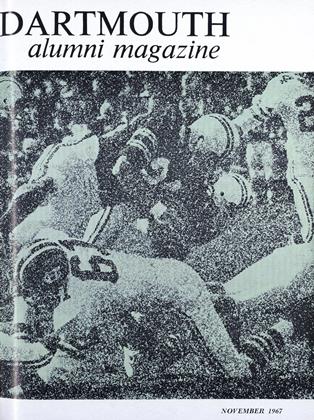It's easy to criticize, difficult to do so authoritatively, hardest to prescribe reform. JEFFREY O'CONNELL '51 succeeds at this menage a trois on two subjects auto safety and auto insurance.
A Phi Beta Kappa who went on to Harvard Law, Air Force service, private practice, and teaching, O'Connell is now Professor of Law at the University of Illinois, specializing in the law of automobile accidents. He has coauthored three books criticizing both the auto industry and the insurance profession. His first, written with Harvard Law's Robert E. Keeton, Basic Protection for the TrafficVictim A Blueprint for Reforming Automobile Insurance, won the Clarance Arthur Kulp Memorial Award sponsored by the American Risk and Insurance Association. Published in 1965, it was the result of a three-year study on automobile claims the two men conducted at Harvard Law School.
The New York Tunes called Safety Last An Indictment of the Auto Industry, which he wrote with Arthur Myers, a former Washington newspaper man, "the best of its kind, in competition even with Ralph Nader's redoubtable Unsafe at Any Speed."
O'Connell takes a gallant view of Nader's books and of the author whom he calls "a fine gentleman." They frequently encountered each other researching their respective books and each was aware of the other's plans. It was a race to publish, and though O'Connell's was written first, Nader's was off the presses sooner.
A third book, also co-authored with Keeton, After CarsCrash - The Need for Legal and Insurance Reform, explains their insurance plan to the general reader. Based on the same principle as fire insurance, Keeton-O'Connell's Basic Protection would insure the victim rather than the "other fellow" and reimburse policy holders for out-of- pocket loss up to $10,000 for unintentional accidents without regard to fault. The non-liability approach, according to the authors, removes the chief opportunity for fraud.
This new form of auto insurance is designed to eliminate the needlessly high cost, the unfair payment, and the court delays caused by the present system. According to one actuary, it would cut premiums 25% and increase payments 25%.
In the recent past, insurance companies have opposed non-fault auto insurance. Lately O'Connell says, the response from the insurance industry can "at least be viewed with hope." Last month the Insurance Company of North America and the Glens Falls Group (both headed by Dartmouth men) ran ads in The New York Times citing the merits of Basic Protection.
O'Connell holds a Presidential appointment as a member of the Department of Transportation's National Highway Safety Advisory Committee. In 1966 he testified at hearings held by Senator Abraham Ribicoff on the unsafe design of cars. Six state legislatures are considering Basic Protection.
But O'Connell, who says it's a mistake to have a Social Security type of government, takes a wary view of govern- ment intervention and exhorts: "The stubborn and totally unrealistic opposition of the medical profession and the insurance industry to changes in the clearly inadequate medical insurance for the aged resulted eventually in that opposition being swept aside by the Congress when it enacted Medicare. . . . Already Congress is preparing to investigate some of the grosser and more obvious evils of automobile insurance."
He belies the image of the unpopular reformer and still has the charm and talent that won him election at Dartmouth to the presidency of his class, Green Key, and Palaeopitus (a record mirrored by his older brother Tom '5O). A classmate remembers him as "intense," the kind who would espouse a cause.
"To dare to say what others only dare to think makes men martyrs or reformers." Jeff O'Connell hasn't shed any blood yet.
 View Full Issue
View Full Issue
More From This Issue
-
 Feature
FeatureA Fulbright Professor in France
November 1967 By FRANCIS E. MERRILL '26, -
 Feature
FeatureMt. McKinley Conquered
November 1967 By Anthony H. Horan '61 -
 Feature
FeatureFINAL REPORT 1966-1967
November 1967 By RALPH LAZARUS '35 -
 Feature
FeatureTHE BETRAYAL OF IDEALISM
November 1967 -
 Feature
FeatureThe Topic: Third Century Fund
November 1967 -
 Article
ArticleWith tine Big Green Teams
November 1967
Article
-
 Article
ArticleFOURTH MILITARY STORES COURSE
December 1917 -
 Article
ArticleFellowship Awarded
November 1940 -
 Article
ArticleA Wah Hoo Wah for –
June 1956 -
 Article
ArticleJust One Spill
APRIL 1982 -
 Article
ArticleA Mac Arthur Award for Gary Tomlinson '73
NOVEMBER 1988 By JENNIFER AVELLINO '89 -
 Article
ArticleSpace Politics
March 1996 By Karen Endicott

